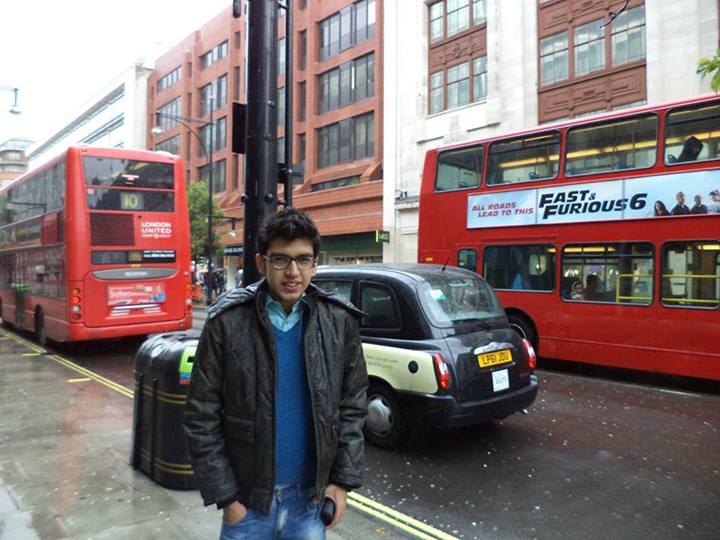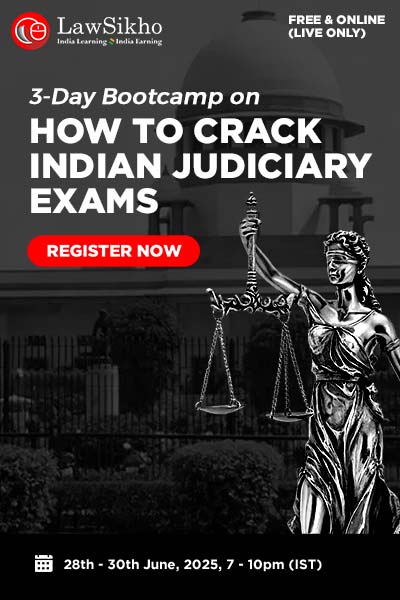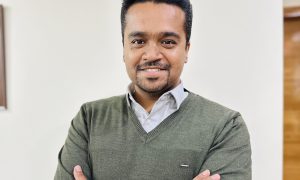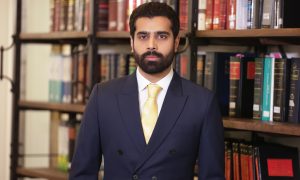Anubhab Sarkar is a student of KIIT, Bhubaneswar, batch of 2015. Anubhab had the rare opportunity to work with Prof. Martin Hunter at Essex Court Chamber in London. He had also interned with Freshfields Bruckhaus Derringer. He keeps a keen interest in International Law and has also served as the president of the International Law Society at his university.
In this interview we speak to him about:
- Procedure for internship application to top law firms
- His research experience with Prof. Martin Hunter
- The difference between a UK based law firm and an Indian firm
Why did you decide to study Law?
I was introduced to law pretty early in my life as my mother is a lawyer, as clichéd as it might sound; though I never liked the idea behind this profession as an adolescent as it kept my mother away from me for long hours. While pursuing my secondary education I was firm that I had no other option of career other than being an engineer. I owe a lot to Mr. Rajneesh Singh who was instrumental in making me believe that law would be the perfect career option for me, he is undoubtedly the first pillar of my legal career. My parents were instrumental in making me gather the courage to take up law. My father used to visit NUJS to get an idea about how a modern day law school functions. I started taking a ‘crash course’ at IMS where I figured that this could something might be able to do; by that time I had seen enough documentaries of Mr. Jinnah, Mr. Gopal Subramaniam (his love for T.S Eliot, Shakespeare and how he creates a nexus between law and literature often excited me), Mr. Nariman and other great legal luminaries and was fascinated by their oratory skills, I was almost convinced that it was something I would like to do for a living. I have always been ardent public speaking enthusiast and thought it would be wonderful if I could put it to use in my daily life. The nail in the coffin was when I found a movie called Paper Chase and happened to watch it; I then realized why an institution imparting legal knowledge is called a law school and not a college. Use of logic and oratory to persuade people, bring a change, however small it might be and of course wearing suits (that never hurts!).
Tell us something about being President of the International Law Students Association chapter at KIIT.
I have been inclined to International Law since the very first year at law school; I of course owe it to a couple of seniors of mine. This prompted me to join the International Law Society (affiliated to ILSA Washington DC) which was student run society in law school. The basic idea behind this was to enhance the aura of International Law, increase quality research, impart proper mooting training, host lectures and events of such sort. When I was elected as the President for the term 2013- 2014, I decided to bring a certain change.
The first event I organized (of course with the help of my committee members) was the 1st KIIT International Law Quiz Competition. The main reason behind this is to make sure there was proper awareness in the sense of general sensibility, quizzing is a passion and what better way to carry out an event to confirm and analyze the awareness. I was quite amazed to see out of all the teams that participated, the winner was not from a law school, rather two engineering students.
We also have future events coming up like the 1st Ian Brownlie Moot Court Competition (which will be on the mooting schedule soon), a conference which will include speakers from each of the continent thus giving us a quality panel debate as to the status quo of the present situation in each of the continents regards to the beginning of a ‘World Court of Human Rights’. The ideology of quality research has also not been forgotten, we keep hosting lectures and our first news letter is due to release soon. It is just a passion which I am trying to carry forward as long as I can. The KCIA (KIIT Center for International Arbitration is a thought child of my senior, who when confided in me the ideas made me more than intrigued. I am sure it will be a great success.
Tell us about your experience in legal editing and publishing?
(Anubhab has been the Honourary Editor of the Sancalp Journal and co-researched and edited a book of international arbitration in addition to presenting some papers as well.)
I believe that a law student grows mentally every day. It was a pleasure being the editor of the Sancalp Journal, it was quite an arduous task to determine and differentiate quality of research and argumentation of papers. I thoroughly enjoyed that experience. Judging others research skills meant that I had to be well read on the themes myself. I took a month just to be well versed with the themes, recent case laws and other scholarly writings so that I can appreciate the analysis of the research of the author. Editing of a book is almost a similar task but its more ‘status quo’ oriented i.e the present status regarding a doctrine, what are the case laws in relation to that doctrine, whether the case law has been over ruled and such other specifications had to be kept in mind.
The degree of challenge was more in this regard as there was no room for error. These activities in a nutshell gives you the quality of thinking critically (quite critically I must say). You can analyze argumentations and put forth the best, you realize what is exactly required of you in a research contention, and you grow a normal understanding of comparing ideologies and then analyzing them as per your rational thinking.
How important is mooting, really?
I must say this has always been a sensitive issue, mooting has always been a passion for me since my first year at law school. According to me mooting cumulates the holistic growth of a law student, the amount of research and reading a participant has to put in enormous. It makes you think critically on your feet, teaches you how to answer judges, duck questions. Suppose you have four arguments for contention, it makes you decide your strongest argumentations as there are word limitation (in a memorandum) and time limitation (in oral rounds). It is very hard to judge your own work and this is the biggest challenge you face in a moot.
I have done several moots and placed in few of them, one thing one must keep in mind while mooting is that research is of course the key but one of the most important aspects of mooting is confidence, you just cannot argue with your temperament down, you have to be up for it and make sure you will give it your best. One advice I would like to give aspiring moot enthusiasts (speakers) is that don’t get too worked up about speaking in front of judge as daunting as it might look, the whole idea is to analyze the judge and respond to him accordingly. You have to understand that the judge will not everything, you will have to know your strengths and play them accordingly.
A very good advice I had received before my first moot was that a speaker should not try taking the burden on him (figuratively) but one should try and have a ‘formal learned conversation’ with judge in order to convince him/her. The judges will try everything to shake your confidence, it is mandatory to keep yourself calm and composed during the whole process. These traits are mandatory for a lawyer and thus mooting according to me way more than a CV addition.
I have seen in foreign universities, how much importance mooting is given. The amount of resources available, coaches and research facilities are unbelievable. For example a Vis Team in University ‘X’ is selected and mentored since their first year and then they compete in the competition in their 3rd year. It is phenomenal the amount of training they get. I have seen in that the major London law schools also get moot court training from the top city law firms. Some of these law firms also host the mock Vis hearings before the actual rounds in Vienna, Austria.
Tell us about your internship experience.
(Anubhab has interned at PUCL, Fox & Mandal, Amarchand Mangaldas and with the Additional Solictor General in India.)
It would be improper to rank these internships as each of these internships have been pivotal in my career, each of these internships are organizations carrying out very different activities. At PUCL, it was a dream as a first year law student having read so many landmark judgments this organization has been a part of, Fox Mandal gave me an idea as to the working of a top tier law firm. It was a challenge to prepare research notes perfectly so that the Associate would add your research to the memorandum.
The internship with the Additional Solicitor General was a different experience altogether, this internship made me aware of the glamour present in the profession. Entering the Supreme Court with a legal legend in a Mercedes or BMW, researching on top notch celebrated cases, attending arbitration hearings at fancy hotels; it was a dream and it also told what you can achieve if you have proper and just dedication towards the profession.
Whereas, Amarchand (which is arguably the best law firm in India) was almost living the life of a transactional lawyer. You knew you had to enter office by 9 AM but you did not have any clue regarding when you would leave for home. It was a different challenge, you had more than one task in your hand at a given time and it was mandatory to maintain deadlines. It was a fascinating experience for you’re almost treated as an employee when it comes to work. All these internships have been progressive to my development to whatever I am. I have always been very selective towards my internships and one things that I have learnt is that it is the quality of the internships that matter, not the quantity.
How did you apply for internship at the ASG’s office? What is the procedure?
The application for an Internship at the ASG’s office is a very simple one but the selection is very limited. You will have to try and play your cards to your advantage. The normal application consists of a cover letter and your CV to the person in charge, but this does not ensure your selection. I had called him up personally and introduced myself and my zeal to work with him. I made sure I called his personal assistant once every week and kept my name around in loop. I was lucky that one evening I got a call from the ASG himself and he stated that he had come to Orissa High Court for a matter and if I wanted I could go and meet him at his hotel. You have to be persistent if you want something, it counts. Dedication and persistence has no replacement.
How was your internship experience in London different from the ones here?
(Anubhab has interned at the Essex Court Chambers, London, and at Freshfields Bruckhaus Deringer, London.)
Essex Court Chambers and Freshfields Bruckhaus Deringer both belong to the elite league of chambers and law firms, called the ‘magic circles’. Working at Essex Court Chamber can be compared to an amateur actor working with the Oceans 13 cast. It was a dream; I was working under the tutelage of Prof. Martin Hunter. My work usually consisted of researching on note points, assisting in research papers, participating in the Kings College London lectures, arranging modules and assisting him. The most amazing part of Essex Court was sharing elevators with luminaries like Malcolm Shaw, Toby Landau and other such greats, leaving aside working with Prof. Hunter himself. Freshfields was undoubtedly one of the best experiences I have ever had, arguably the best law firm in the world. The exposure an intern gets in a firm or chamber like this is unparalleled, an intern is made to be a part of client meetings, and there are separate sessions for interns enlightening them about social responsibility in a law firm. Pro bono work on a Friday was a must (also Fridays were dress down days, such that you could wear informal clothes to work, which was amazing); it consisted of assisting the homeless in London with legal matters and other such activities. Socials were a frequent occurrence, where we could interact with any and everyone in the firm at a personal and professional level over drinks.
The mentors were to take the interns out for lunch once a week to a nearby restaurant. These little things gives a different perspective to interns in regards to the working of a law firm and getting to know your mentor well adds to the understanding. I remember I was asked to draft a part of a memorandum along with a ‘summer associate’ from the New York office of Freshfields. You do enjoy the amount responsibility and the exposure was impeccable, managing time differences and sharing research and getting the work done. It was satisfying.
What was the procedure you followed for your applications to the big shot law firms?
Application to top shot law firms require a lot of patience, sending a mail with your CV is of course not enough. You will have to know how to sell your strengths and eclipse your weaknesses. While applying to Indian top tier firms I have often called the relevant HR first and tried to sell my strength in relation to a possibility regarding an internship in that firm. The HR will get annoyed if you push too much, you will have to be very confident and brief in what you say, once you do that, if you have done marginally well in convincing her she will ask you to send your CV. Once you do that you can place reliance on your CV for the rest to work out. In reality a HR in a top tier law firm gets almost 100 applications a day during the internship period. That conversation will surely create a mark and for the rest you can rely on your credentials. It has worked for me, the key I believe is patience and persistence, what is very important is that you have to know the limit so that it doesn’t work against you.
Foreign Law firms on the hand have a very open process. You can apply only at a certain period and the application procedure consists of certain questions analyzing your career and character. These questions have a very critical word limit. For example, I once had faced a question which read such, ‘Mention all your achievements in school and law school, academically and co-curriculars’ the word limit was 250 words, you might think it is impossible to answer this question within 250 words but there lies the challenge of being precise and using simple English and sticking to the word limit. These simple things amount to qualification to the next round which is generally a logical reasoning test followed by an interview. Firms like Allen and Ovary, Herbert Smith and Clifford Chance has provisions for Indian students to work with them, more Indian students should avail these opportunity, even if you don’t qualify, the application procedure to these law firms teach you a lot of things. It’s quite a daunting task and an enriching experience.
How important are grades?
I believe CGPA does play an important role but only to a certain extent, one should maintain a CGPA of above 70 percent and then he/she can rely on his/her credentials to pull them through the rest. It is understood that a law school curriculum demands a lot of attention to many different things i.e. mooting, research papers, internships. It’s mandatory that you have a decent CV so that you can pull through the rest on the credibility of your CV. Everyone must be aware that Indian scenario of internship often depends on contacts but it is not that it can’t be done without contacts.
I have believed in a simple model such that the networking you do in your first internship should open the gateway to your second and subsequently it will go on. Networking is an art, an art of dealing and mixing with people so it is essentially your work that ends up bearing results.
Was your typical workday during your internships in India any different from your workday abroad?
My normal work day in London would start with a fifteen minute walk by Chancery Lane to 64, Fleet Street (heard of legal London). At Freshfields, all the interns were supposed to meet for coffee at 9 AM the office café (Café 65) discussing our practice as we belonged to separate teams (some in arbitration, some in anti-trust etc.) . Our mentors came and picked us up and we were briefed about that days routine on our way from Café 65 to Whitefriars, the day would consist of general research work, briefing our mentor and other such activities like attending social drinks, team lunches/dinners, mentor lunches etc. The best part about interns and employees there is if your work gets over at 4 pm, you leave at 4 pm you don’t have to stay back to impress anyone for that doesn’t impress anyone. In India, though I have thoroughly enjoying working here an intern is bound to certain restrictions, an intern naturally can’t work into the office of a partner. I have noticed abroad there is no such guideline; anyone can walk in anywhere with a valid query or even for a casual chat if the person is free. There are some ideological differences but I think that doesn’t hamper the quality of work here.
What were the prime difficulties you encountered interning abroad?
To be frank there weren’t any difficulties as such (England being a common law country, there is lot of similarity with our system), in the beginning you were often unaware the standard of work/research you were expected to deliver, but my colleagues were more than welcoming and helpful. Though there were certain things which I wouldn’t call ‘difficulties’, for example my English colleagues over lunch would often humorously discuss various English Judges (like we would do, for example regarding Justice Singhvi’s Section 377 judgement) and deep threaded ‘English political occurrences’ which is not general knowledge to an Indian. I essentially had to keep track of legal developments in England and such other happenings as this a part of work environment ethos but there is no such significant ‘difficulty’.
How are law firms abroad different from the ones at home?
As I mentioned before, there is a lot more liberty for the interns in a law firm abroad. I think this is because of their intensive application procedure the holistic quality of the interns is above average, hence the exposure and responsibility given to interns is way more than that is given in Indian law firms. There is no hierarchical treatment there, you’re considered to be ‘worth it’ of you are working there. The level of responsibility is very satiating.
How has your experience been working closely with such a legal luminary like Prof. Martin Hunter?
It was living a dream to be working with a person like him. Who other than being a legal great is also a great human being. His approach to mentoring is not the traditional way, it was more like a mid way between practical and theoretical approach, it would make you think on different perspectives. One would realize along with law you learned a lot more, you learned about life. It was indeed an enriching experience, something I will remember all my life.
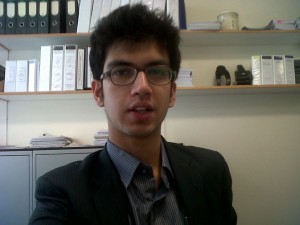 Lastly, what are your plans for the future?
Lastly, what are your plans for the future?
I plan to do my LL.M. from Stanford University as it has been a dream; the professors and the course structures are unbelievable. The course on legal philosophy can be taken with the International Arbitration module, I have been working steady towards it hoping it will realize. I won’t be shocked if I squeeze in a couple of years of work post my graduation in order to neutralize some of the fees towards my LLM, in case of unavailability of additional funding.
Internships are very important, it gives you a practical aspect of what you want to do in the future. Choose your internships very carefully it helps a great deal in analyzing your future chart. I have been very selective about my internships, of course this approach doesn’t often help because the place you want to work in might not have a vacancy, for such reasons it is mandatory to have a strong sense of determination. Even if you come 50% closer to your dreams, trust me it is a good run.
Never be afraid dreaming, dreams shape us. Be optimistic, there is no replacement for hard work but that doesn’t mean you don’t have your share of fun. Don’t be a part of the rat race; keep an eye on the rat race from far away. You will get to know what you ‘don’t’ need to do. Moreover, always remember it is the noblest profession that you are in, as the greatness of a man depends on the number of people you serve, not the number of people who serve you (Something which I had picked up during my brilliant twelve years at St. Xavier’s Collegiate School). Lastly keep close to your friends; they are one of your greatest supports, I am glad to have a fantastic set of friends who I have grown up with in school. They help you channel yourself for the best!

